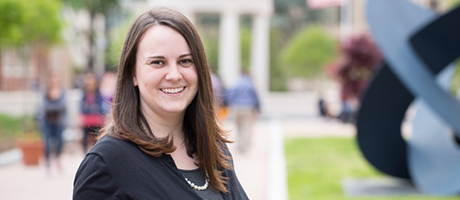When Maggie Unverzagt Goddard takes the podium as the Columbian College Celebration graduate student speaker on May 16, faculty, family, and fellow graduates are sure to hear the word “connections” sprinkled throughout her speech. It’s the theme of her address and, in fact, has been her focus throughout her years as a scholar of American Studies. She seems to have a knack for finding academic, cultural, and even social connections that others often don’t see.
Take, for example, how she connected the topics of art, politics, and gender as a means to inform our opinions on American culture. Her graduate research, which was presented at two conferences this year, related avant garde feminist art to U.S. presidential history and American Girl dolls. Even Monica Lewinsky’s thong was discussed as a source of feminist and political controversy.
And, as a teaching assistant for the course Race, American Medicine and Public Health—taught by Professor of Medical Humanities and American Studies Vanessa Northington Gamble—she managed to weave together the themes of history, politics, and health. The course’s multi-disciplinary focus resulted in attracting students from across the university, including majors in criminal justice, American studies, and biology, as well as student studying medicine.
She’s even combined an appreciation of arts and sciences with a healthy dose of humor, which is how she tackled her varied responsibilities during her internship at the Corcoran Gallery of Art last summer. For example, in the span of one week, Goddard went from documenting the imposing bureaucracy of Common Core standards for art classes to donning a green spandex alien costume and dancing in front of the Lincoln Memorial to promote an exhibit.
While the audience at the Celebration ceremony on Friday may not hear references to outer space and spandex, they will hear the newly-minted graduate expound on her principle focus: the importance of interdisciplinary thought, study, and action.
“Whether you are an American Studies major or a chemistry student or you’re into anthropology, it’s important to build coalitions and recognize that we are working on shared projects,” said the 25-year-old from Cleveland. “If you look closely, there are deep connections that we can all pursue.”
Goddard received the 2014 Columbian College Distinguished Master’s Degree Scholar Award, an annual honor for exceptional students that includes the role of celebration speaker. Kip Kosek, associate professor of American Studies, nominated Goddard for her innovative research approach to race, gender, and mass media in American culture—an approach that interwove music videos and feminist art to offer a fresh perspective on history and politics. In one notable presentation, Goddard examined the “politics of bloomers,” paralleling changes in women’s clothing with their success in winning elections.
“Maggie gets how to incorporate a diverse range of sources and methodology to come up with better ways of understanding culture,” said Kosek. “And she puts together the things she does in the classroom with opportunities and challenges she’s found outside the classroom. Somehow, she makes them all work together.”
While at GW, Goddard sought out leadership roles in public culture and arts and education. At the Corcoran, she guided educators on using the collection in their classrooms. Her alien dance promoted artist Ellen Harvey’s exhibition The Alien’s Guide to the Ruins of Washington. Goddard also filled her calendar with volunteer activities for groups like Points of Light, City Year, and FORCE: Upsetting Rape Culture. She’s prepared care kits for military personnel serving overseas, painted murals in D.C. public schools, and installed art projects that created public safe spaces for survivors of sexual assault and abuse.
Even after graduation, Goddard won’t be slowing down. She’s joining Associate Professor of American Studies Teresa Murphy for a project with the Smithsonian that explores material culture in political expression. In addition to planning a conference around the project, Goddard will be combing through museum archive items for inclusion in an eventual exhibit. “I get to rummage through a lot of old stuff,” she laughed. “For me, that’s heaven.”
Long-term, Goddard plans to pursue a PhD and a career in academia. Her research and volunteer tasks have kept her so busy that she’s looking forward to catching up on long-planned pursuits, like learning to play the ukulele and reading—a lot. “I’m so nerdy that I’m excited to be done with school so I can read more books,” she said.
And while Goddard approached graduate school as more of a professional experience than her undergraduate studies, she stressed the importance of finding time to reach out between disciplines—and, of course, make connections. “It’s certainly been an exciting journey,” Goddard said. “I’ve been a thong scholar and I’ve perfected the nuances of alien impersonation. I never thought I’d see that on my resume!”


